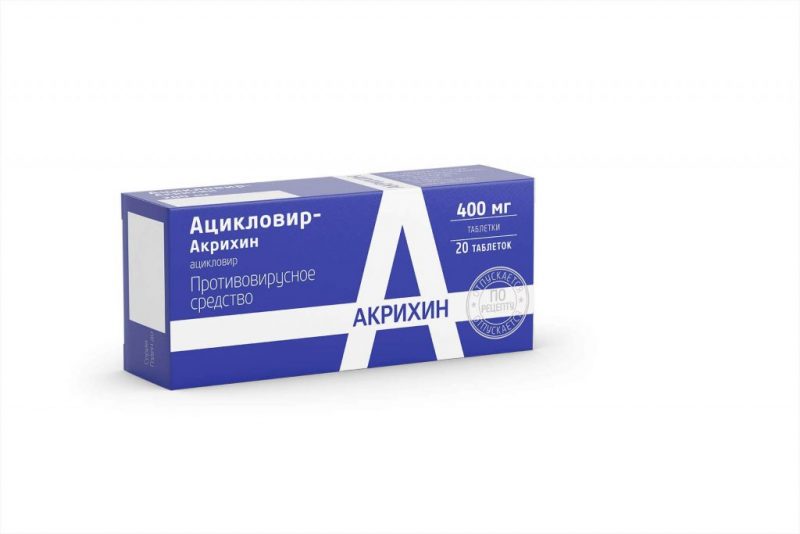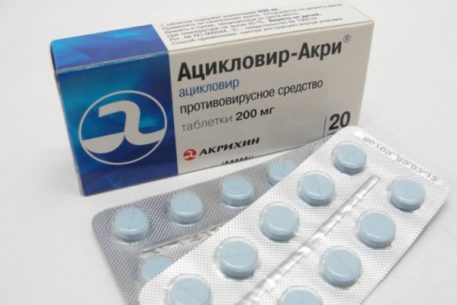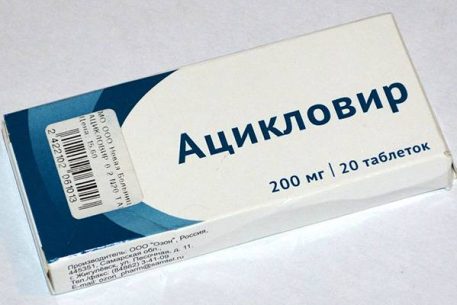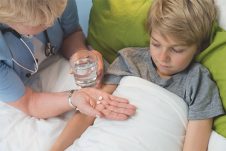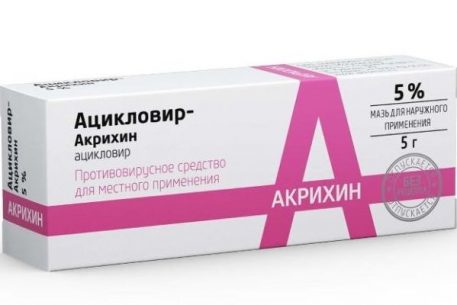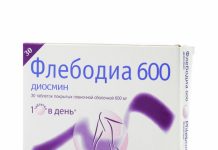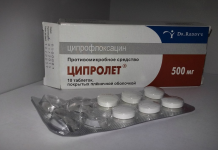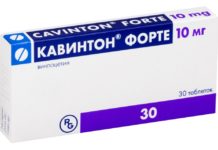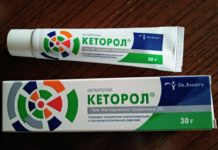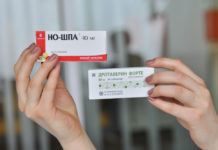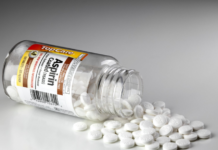Any pharmacist will advise a patient with wounds on the lips to buy Acyclovir tablets, since this is the best medicine in the fight against the Herpes virus. How effective is this medication and why is it strongly advised to always have it in your home medicine cabinet? Learn more about him from this article.
Material Content:
- 1 Composition and description of the release form
- 2 Pharmacological action, pharmacodynamics and pharmacokinetics
- 3 What helps Acyclovir
- 4 Instructions for use for children and adults
- 5 During pregnancy and lactation
- 6 Drug interaction
- 7 Contraindications, side effects and overdose
- 8 Antiviral drug analogues
Composition and description of the release form
Acyclovir is an antiviral drug that was developed on the basis of an acyclic nucleoside and is its synthetic analogue. Nucleosides are compounds that have the ability to destroy Herpes viruses and that is why Acyclovir is successfully used in the treatment of diseases caused by this organism.
Its effectiveness is due to the distinguishing feature of the active substances present in the composition, to integrate into viral DNA and block them. This stops the reproduction of infected particles and the spread of the disease. The main active ingredient of the drug is acyclovir, and lactose, magnesium stearate, silicon dioxide and various types of flavorings are also used to create tablets.
Acyclovir is sold in tablets, suspensions for injections, in the form of an ointment and a solution for droppers. Tablets are one of the most popular forms of using the medication, since they are most convenient to use. They can be freely bought in pharmacies, they are in plastic blisters, 10 tablets each.
Pharmacological action, pharmacodynamics and pharmacokinetics
Acyclovir resists a virus called Herpes simplex and this allows it to be effective in the treatment of various diseases spreading by the indicated pathogenic particle. In addition, Acyclovir is able to suppress Varicella zoster, as well as microorganisms that provoke Epstein-Barr disease. The drug is used as an adjunct therapy to suppress the cytomegalovirus that causes tumors on the body.
The pharmacological effect of the drug is due to the ability of the active substance of acyclovir to rearrange the viral chains of DNA that affect the cells of the body and stop their division, thereby stopping the development of the disease.
The drug prevents the formation and spread of rash, reduces pain, reduces the likelihood of complications and accelerates the appearance of a crust on rashes, which leads to their quickest healing.
The tablets enter and are absorbed from the digestive tract through the walls of the small intestine into the blood, rapidly spreading throughout the body. The bioavailability of the drug is about 20%, regardless of form, while the absorption of tablets is not affected by food intake. After 1.5-2 hours after oral administration of the drug, its maximum concentration in the bloodstream of a person is observed. It spreads throughout the body from brain cells to the mucous membranes of the vagina, and is excreted through the urinary system.
What helps Acyclovir
The medication destroys viral pathogens, thereby providing effective assistance in the fight against infectious diseases.
Among them are infections:
- skin (herpes genital, primary and recurrent);
- acquired immunodeficiency;
- chickenpox, primary and recurrent;
- shingles and diseases that are provoked by the microorganism Varicella zoster.
Acyclovir is low toxic and has a high selectivity of action. It is used as a prophylactic to prevent infections in HIV-infected people. And it is also prescribed without fail to patients who have organ transplants, have chemotherapy, a blood transfusion, or they have been taking immunosuppressive medications.
Instructions for use for children and adults
The medicine does not have a single dosage, it is prescribed by the attending physician after an accurate diagnosis of the disease. Children can take Acyclovir tablets after two years, but only by decision of the pediatrician.
For other patients, there are several options for taking:
- Acyclovir tablets 200 mg can be taken by patients older than three years from 4 to 6 times a day if the disease was caused by Herpes simplex. Between doses of the drug should be an interval of at least 4 hours. If Acyclovir 400 mg tablets were prescribed, then the course of administration is reduced to 1 week, and 2 tablets of the drug are taken daily at intervals of 6 hours.
- Acyclovir for adults is prescribed for the treatment of immunodeficiency, as well as for the prevention of 400 mg up to 6 times a day.
- If the disease is provoked by the activity of the Varicella zoster particle, then all patients who weigh 40 kg or more are prescribed five times the dose of 800 mg at a time for 10 days. Children with body weight less than 40 kg need to calculate the dose individually, 20 mg of the drug per 1 kg of weight.
- In case of lesion with herpes zoster, the patient should take 800 mg 4 times a day. The interval between doses is 6 hours, and the course lasts 5 days. If the disease is diagnosed in a child under the age of 6 years, then the dosage for him is calculated individually.
- If the patient has renal failure, then he is prescribed 200 mg of the drug twice a day (with the herpes virus), with the Varicella zoster virus, the dose is increased 4 times.
If the patient, in addition to infection, has acquired immunodeficiency, the medication is taken twice a day at 200 mg. Tablets must be taken orally, washed down with still water. It is advisable to do this after eating or during it.
During pregnancy and lactation
During the tests, the passage of the active substance of acyclovir through the placenta of the fetus was confirmed, therefore, doctors do not recommend it to be taken by pregnant women. Although there was no evidence of the occurrence of pathogenic mutations in the embryo when the mother consumed Acyclovir in the first trimester, when the fetus was particularly exposed to chemicals.
And also scientists found that acyclovir is observed in mother's milk if she takes the drug in question. Its concentration was 0.6–1.4% in breast milk - this means that the baby will receive up to 0.3 mg of the drug per day per 1 kg of its weight. Therefore, women who are breastfeeding are not recommended to take the medicine only if it is not caused by extreme necessity.
Drug interaction
Acyclovir is allowed to be used simultaneously with other medicines, since it does not cause systemic disorders.
However, caution should be exercised when taking it along with this type of medication:
- Diuretic action. In particular, with the simultaneous administration of Probenecid, the excretion rate of Acyclovir decreases, which can lead to an overdose.
- Nephrotoxicity, as the risk of developing renal failure is increasing.
And also, an increase in the effect of acyclovir is noted with its simultaneous use with immunostimulating substances.
Contraindications, side effects and overdose
Acyclovir is prohibited for women who are in the process of feeding a child, as well as for children under 3 years of age. In addition, the main contraindication to taking the medicine is hypersensitivity to its main active substance (acyclovir, ganciclovir or valacyclovir) or auxiliary components.
Patients with renal failure should take the drug with caution, as well as patients who have dehydration or neurological disorders. In all other situations, the medicine is well tolerated and does not cause any disturbances. Mild nausea or diarrhea can sometimes occur.
Side effects may include:
- headache and general weakness;
- fatigue and drowsiness;
- allergic reactions in the form of urticaria or edema.
If medical recommendations regarding the regimen are not followed, an overdose of Acyclovir may occur in the patient.
It is accompanied by a number of symptoms:
- headache;
- dyspnea;
- vomiting
- leg cramps;
- lethargy.
In case of an overdose, you should immediately induce vomiting and empty the stomach, as well as consult a doctor and receive symptomatic therapy that will restore and support the vital functions of the body. Drink plenty of fluids to prevent dehydration, and hemodialysis is recommended.
Antiviral drug analogues
The active substance of this drug can be found in many drugs that are used in the treatment of viral infections. The main structural analogue of Acyclovir is Acyclovir Akrikhin. We can say that the difference lies only in the name, while the composition and pharmacological effects of these drugs are almost identical. And also the price is different, the drug Acyclovir Akrikhin is somewhat more expensive.
Other analogues include such drugs:
- Acigerpine.
- Vero-Acyclovir.
- Gervirax.
- Cyclovir.
- Citivir.
And also there are a number of ointments of similar action. These include Zovirax, Gerpevir and Lysavir.
Analogues of Acyclovir may differ significantly from it in price. As for efficiency, it still remains in the leading position in the pharmaceutical industry and has been very popular for many years.
Acyclovir is a drug that is not only effective in combating viral pathogenic particles, but also prevents their spread throughout the body.At the same time, it removes the discomfort that occurs after the rash appears and reduces the peeling of the skin that accompanies the rash.


